New and Continuing C-StREAM Fellows
This summer, the CRC welcomed one continuing C-StREAM Felllow (Nick Coleman) and ten new interns, all of whom were introduced in in our May Newsletter. They have all been having a productive summer, spending time on boats, in the field, at computers, and in labs at locations around the watershed. All will have finished their summer programs by the end of this week and most will have presented their work to cohorts. Those working with the US EPA-CBPO will be presenting their results this coming Friday (August 16) in Annapolis at the “Fish Shack” in Annapolis, from 12:30 to 2:00 in a symposium that is open to the public.
In the course of their work, all of these students have made important connections with scientists, while using the C-StREAM program to advance their careers and skills. We had the chance to ask them what they’ll take away from this summer. Here’s what our interns have been up to, in their own words.
Anthony Johnson
Mentor: Ms. Stacey Havard and Dr. Linsey Haram of the Marine Invasions Research Laboratory at SERC
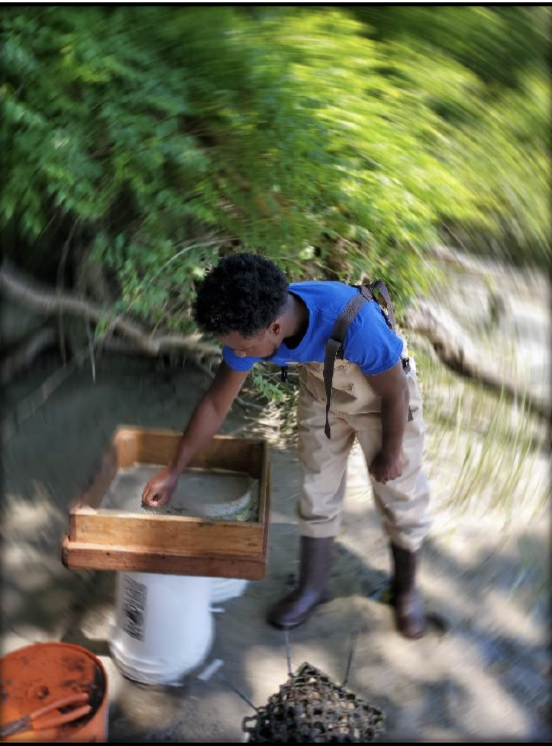
Anthony at his SERC internship
What have you been working on?
This summer at Smithsonian Environmental Research Center (SERC), I am working with a lot of different researchers with their own projects. From using trawling nets on a boat to catch and tag flounder, to looking for snails with parasites out of a kayak. Fortunately, the two main projects I have been involved in mostly is the Marine Debris project and Nearshore Surveying. For the Marine Debris project, I am working on my own project dealing with the colonization of marine invertebrates on plastics. By doing so, I have deployed several arrays of the six different kinds of plastics in two marinas in Delaware. Additionally, for Nearshore Surveying, I am seining and using nets to collect and count grass shrimp and fish in the local Rhode river. From these experiences, I have learned a lot of new techniques, equipment and facts about marine organisms I never heard about.
What advice would you give to future interns in your position?
For future interns going into my current position, I would advise them to be open-minded and to take every opportunity that comes their way. From these opportunities, you may learn new skills, connections and interest. Having experience in the field/lab and connections with a broad range of researchers/interns will definitely help you in the long run when you are looking to pursue your dream career.
How has your mentor helped prepare you for a career in environmental management or research?
Both of my mentors, Linsey and Stacey have prepared me for a career in environmental research by exposing me to their project topics and real-life consequences. Plastics are a rising concern in the world today. Not only are they consumed by organisms but provide transportation for small creatures like bryozoans to other parts of the world, making them invaders.
Have your thoughts on what you want to do in the future changed at all? If so, how?
My thoughts on becoming either a Fisheries Biologist or an Aquatic Veterinarian has not changed. From this internship, I believe my interest in these two careers has increased due to me being exposed to field work on a constant basis. Every day is literally a fun day at SERC.
Dia Brown
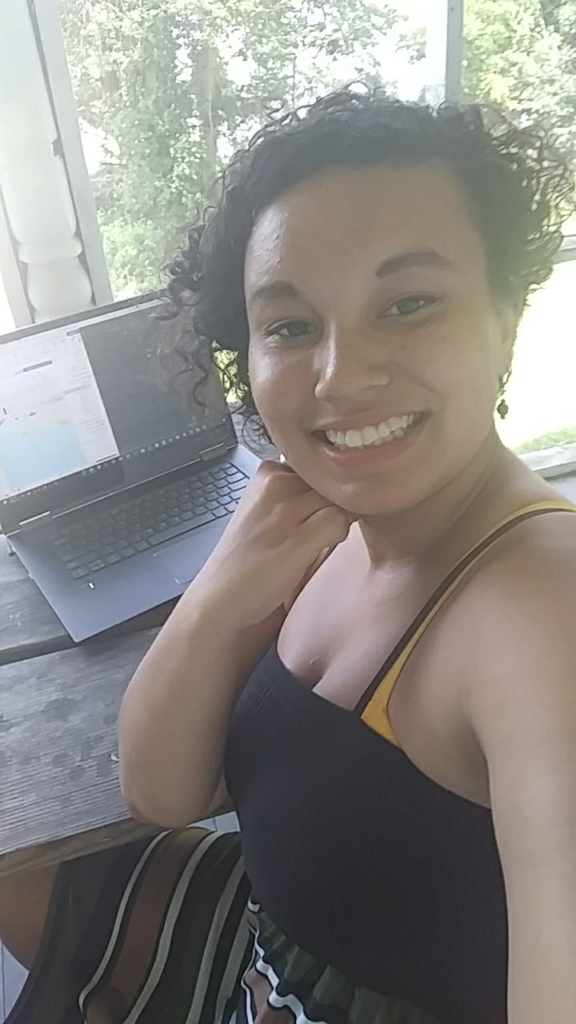
Dia at her desk at her internship.
Mentor: Dr. Emily Trentacoste at EPA Chesapeake Bay Program Office
What have you been working on?
I have been working with the Chesapeake Monitoring Cooperative’s Citizen Science data and showing what data is available and how it can be used. The day includes a variety of water quality measurements and data collected on benthic macroinvertebrates.
What advice would you give to future interns in your position?
My advice to someone working in this position next year would be to make or get your own standing desk and to make sure to take a walk before you come into work! Doing computer work for long hours is not the greatest for your legs/ body if you spend the whole time sitting—so get creative about how you incorporate activity into the work day (I wake up to make time for an hour long walk at a park near my house and when I need to watch tutorials or read articles to learn things I do stretches!!!).
How has your mentor helped prepare you for a career in environmental management or research?
She has helped by having me create goals for this internship in the beginning of the summer and by scheduling meetings to talk about progress in the internship.
Have your thoughts on what you want to do in the future changed at all? If so, how?
My thoughts on my career are still the same as far as wanting to focus more on the structural side of environmental engineering, but learning more about the water has been useful in framing this path!
Georgie Alvis
Mentor: Dr Amy Collick at Univ. of Maryland Eastern Shore
What have you been working on?
I’ve been working on water quality research of a local watershed that drains into the Chesapeake Bay. We collect water samples from different points throughout the watershed and determine the concentration of urea, phosphates, and nitrates in each sample. My research focuses on urea concentration changes in the water and how land use, weather, and location impact the concentration. I’ve learned a lot about nutrient pollution in its affect on the Bay as well as learned a lot about the research process.
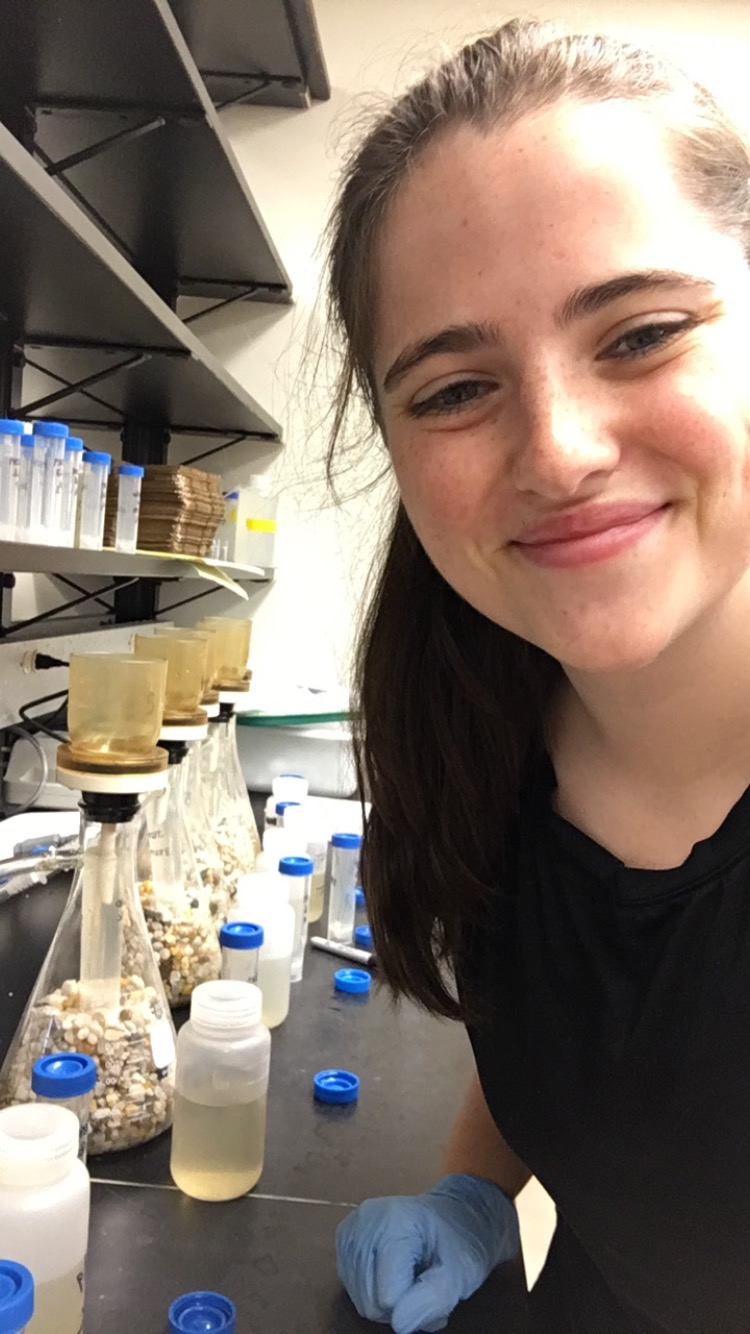
Georgie filtering water samples at her internship.
What advice would you give to future interns in your position?
Start your background research early! There’s so much more there than you expect.
How has your mentor helped prepare you for a career in environmental management or research?
Before starting this internship, I had never conducted research before. My mentor has helped to guide me through the process, which initially seemed very overwhelming.
Have your thoughts on what you want to do in the future changed at all? If so, how?
My future plans have not changed due to this internship. I have intended to work towards a Master’s degree for some time and now I feel much more prepared for it.
Heather Levine
Mentor: Taylor Armstrong at the Institute of Marine and Environmental Technology (IMET)
What have you been working on?
This summer I am helping Taylor Armstrong, a PhD student at the Institute of Marine and Environmental Technology (IMET), study the affect of barley straw and spent grain on the growth and toxicity of cyanobacteria. Cyanobacteria is a species of bacteria that can emit a harmful toxin (microcystis) and in large quantities looks similar to algae. Cyanobacteria blooms have become more of a concern in recent years, due to its widespread occurrence and toxicity. High concentrations of microcystis have been shown to harm humans and to kill aquatic life and small mammals. In previous studies, barley straw has been shown to inhibit the growth of cyanobacteria, so the goal of this research is to discover what it is about barley straw that inhibits cyanobacteria growth and if spent grain (a waste product from breweries that is mostly barley) has a similar effect.
Primarily, I have learned about lab techniques and research in general. I learned how to transfer bacteria cultures without contaminating them, how to use a flow cytometer to count cells, how to extract DNA from fungus, and soon I will learn how to use a LC-MS/MS machine to differentiate compounds in a sample.
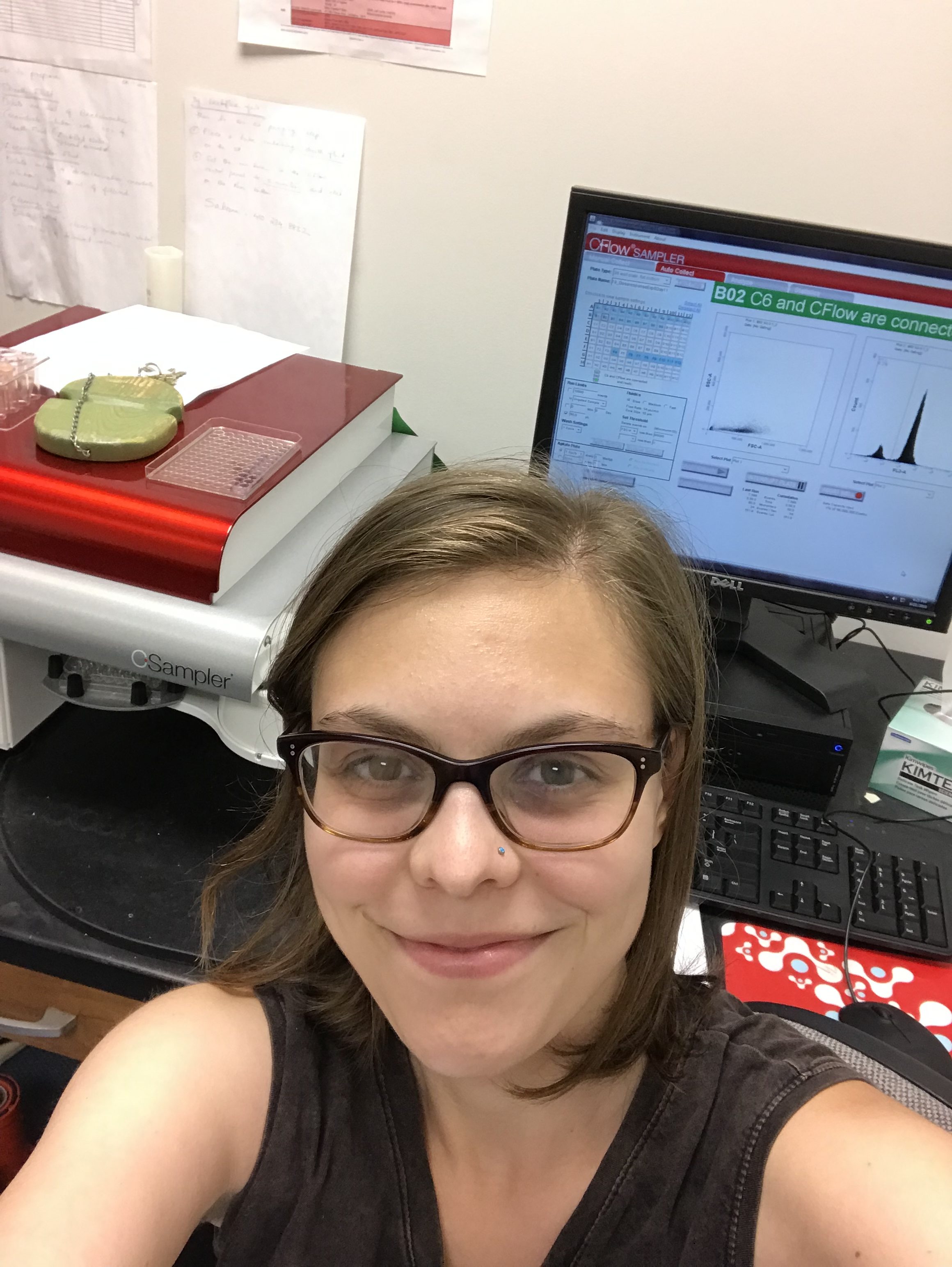
Heather with a flow cytometer. “I spend most days counting cells to check the growth rate of the cyanobacteria in our experiments,” she said.
What advice would you give to future interns in your position?
The advice I would give an intern in my position is to not be discouraged. The first couple days or even weeks of a job may feel uncomfortable, but it does get better. Additionally, always ask questions. Knowing is always better than not knowing in a lab environment. Some people I know here don’t want to ask their mentors questions because their mentor isn’t overtly friendly, but it is important to do so anyway to avoid lab accidents and to save time in during the research process in general.
How has your mentor helped prepare you for a career in environmental management or research?
My mentor, Taylor Armstrong, has helped prepare me for my future career by making the research approachable. She answers all of my question in a patient and straightforward manner, and has helped me gain confidence in a lab setting.
Have your thoughts on what you want to do in the future changed at all? If so, how?
This research experience has underscored that I think I want to join the workforce before going to grad school. At the end of last semester, I was on the fence about whether or not to pursue grad school directly after graduation, but now I am sure that I want to further explore my career interests before committing to a Masters or PhD program.
Makayla Brown
Mentor: Dr. Bruce Vogt at NCBO
What have you been working on?
This summer I’ve been creating a story maps for NCBO funded projects that focus on communicating the value of fish habitat and forage species as well as oyster reef ecosystem services (ORES) to the public. I’ve learned a great deal about the value of oysters not only as a living resource in the bay but their contribution to nutrient cycling, water quality, and fish habitat. From my understanding of the research that I’ve read, oyster restoration has a measurable rate of return for a jurisdiction’s economy and environment.
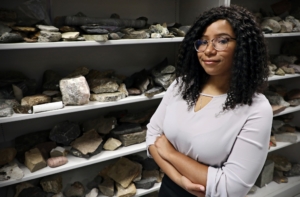
Makayla poses. for a photograph in her department’s lab. Photo by Aileen Devlin, Virginia Sea Grant
What advice would you give to future interns in your position?
My advice to incoming interns is that the alphabet soup of acronyms gets easier with time! Once you meet a face, familiarize yourself with the organizations’ projects, and see these amazing environmental stewards in action, it will all click.
How has your mentor helped prepare you for a career in environmental management or research?
My mentor, Bruce Vogt, and some of my coworkers at NCBO have been instrumental in providing new opportunities and connections. Bruce frequently encouraged me to attend meetings that with managers, private sector consultants, and government agencies sitting around the same table to discuss the progress and issues of Chesapeake Bay fisheries. Being a fly on the wall at these meetings allowed me to have a window into the responsibilities and roles of various positions. My coworker, Mandy Bromilow, also organized an opportunity for us to participate in field work. So while most of my work was done in the office, we did get to help with two fish surveys at VIMS. It was meaningful to see some of the issues we had been discussing at meetings present themselves in the catches on those days. Notably low salinity from rain events affecting the kinds of species we found and low fish abundance in deep waters with dead zones showing how DO affects fish habitat in the water column.
Michaella Kuykendall
Mentor: Dr. Labeeb Ahmed and others on the Chesapeake Bay Program’s GIS Team
What have you been working on?
This summer I have been working with the GIS Team, under the direction of the Land Use Group on 2 projects.
- The first is determining if the numbers published by the Chesapeake Conservancy regarding the amount of land available in each watershed state for Riparian buffer restoration. Through my analysis, I found that the numbers published by the Conservancy and those I calculated are different. Due to this difference, specifically Pennsylvania government, is unable to contact farmers in regard to adapting BMPs that establish riparian buffers on their land.
- The second project I have been working on is analyzing the change in National Land Cover within the Chesapeake Bay watershed every 3 years from 2001 and 2016.
What advice would you give to future interns in your position?
The advice I would give a future intern in my position is to make sure they decide early on what they want to be working on while they are here. I got lucky in that I enjoy the work I am doing to help the Land Use team. They should also focus on how they can portray their work in a final presentation and plan as time at this internship goes on.
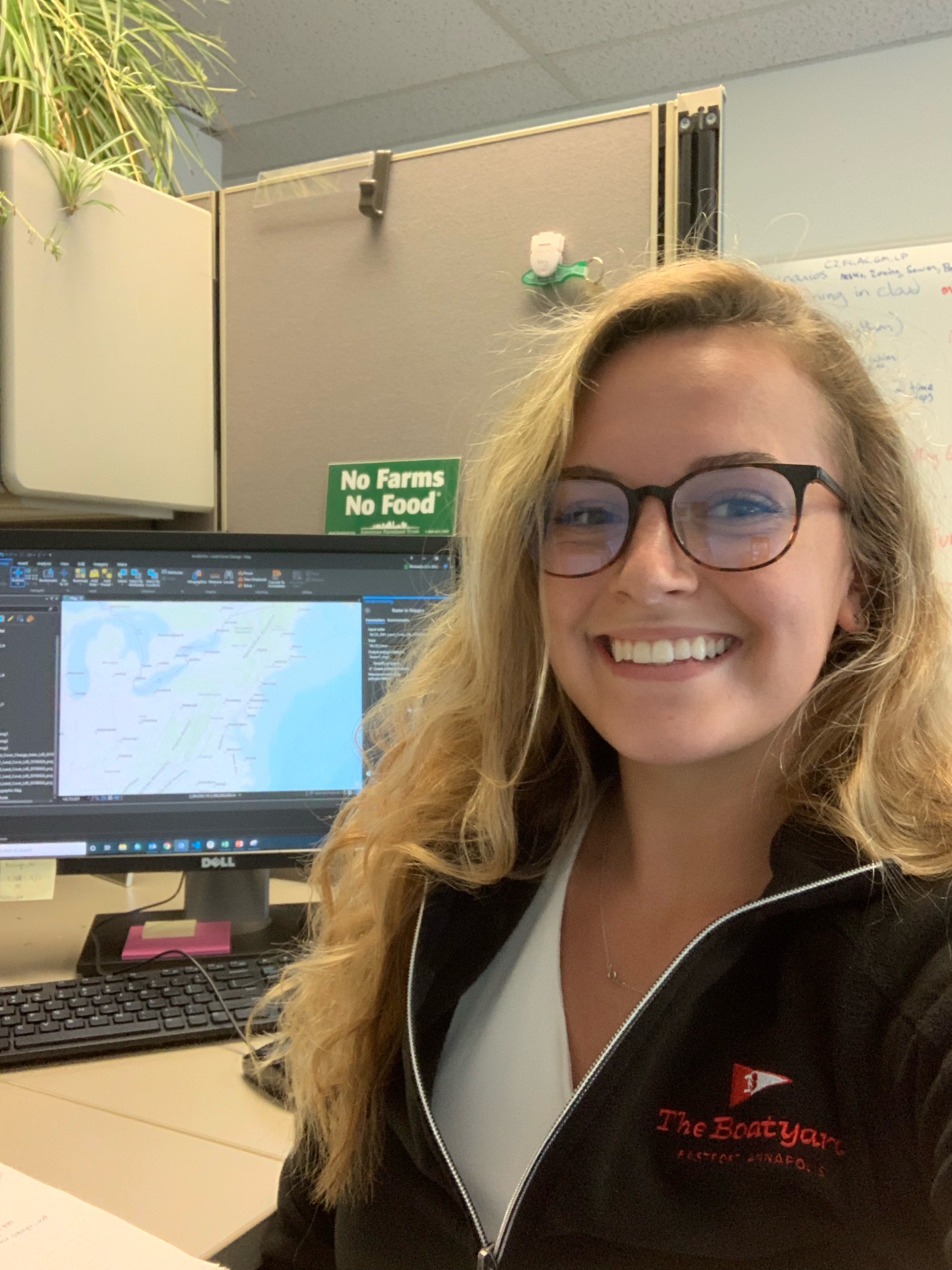
Michaella at her desk.
How has your mentor helped prepare you for a career in environmental management or research?
My mentor has prepared me for a career in environmental research by giving me real-world experience of what I would be doing as a geospatial analyst in a professional field. It is easier to imagine what a full-time position in this field would be like now that I have been able to work in it for a few months. I have also been prepared for the amount of collaboration and teamwork is necessary alongside of individual work in order to accomplish tasks in an environmental research career.
Have your thoughts on what you want to do in the future changed at all? If so, how?
My thoughts of what I want to do in the future have not changed too much. I would love to continue performing geospatial analyses in order for governments to make more informed environmental decisions. The only difference this opportunity has taught me is that I would prefer a career that allows me to spend more time outside.
Nicholas Camacho
Mentor: Dr. Feng Chen at the Institute of Marine and Environmental Technology (IMET) at UMCES.
What have you been working on?
This summer I have been working with Ana Sosa of the Institute of Marine and Environmental Technology to study the biodiversity of microorganisms that comprise the biofilms surrounding different varieties of microplastics in the Baltimore Harbor water. Over the course of this project, I have learned much about the different varieties of plastics and how microorganisms within the marine environment interact with plastic pollution. Furthermore, it has been a learning experience to witness the damages and ecological effects of microplastic pollution in Baltimore’s estuarine waters.
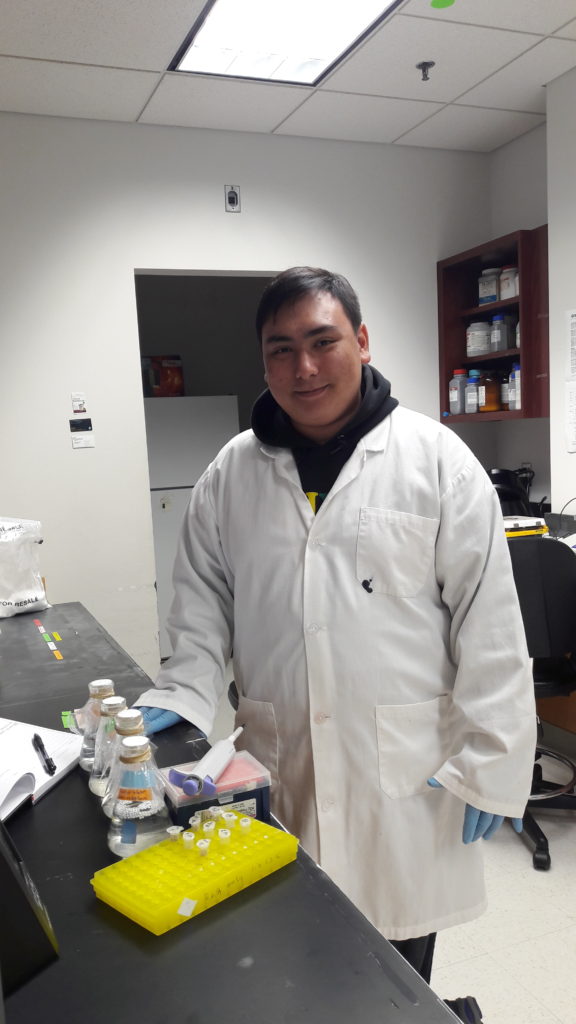
Nicholas in his lab.
What advice would you give to future interns in your position?
Although research involving pollution in the marine environment can be difficult and dirty, you develop an incomparable fascination with the complexity and diversity of microscopic lifeforms in the water. As a researcher, you get to see firsthand how the living and nonliving elements of the ocean are interconnected. I guarantee that at the end of your project, your work will change the way you view science, the ocean, and the world.
How has your mentor helped prepare you for a career in environmental management or research?
Having never before worked with microplastics or within the field of marine microbial ecology, I was initially intimidated by the research. My mentor, Ana Sosa, taught me the necessary skills and techniques for this type of research, but more importantly, she showed me the passion, curiosity, and perseverance that a successful researcher must have. Reflecting at the end of each lab day, it wasn’t about how much I knew, it was about what I was going to do tomorrow to learn more. Whether or not I pursue similar marine research in the future, I thank my mentor for providing me with the tangible and intangible resources for a productive career.
Have your thoughts on what you want to do in the future changed at all? If so, how?
If my passion for marine science has changed, then it has only grown stronger. Coming from the island of Guam, I grew up around the Pacific Ocean as a familiar body of water. Conducting microplastic research in the Baltimore Harbor has allowed me to experience an entirely new body of water and has helped me better understand the relationship between the coastal waters of the Chesapeake Bay and the waters of my home in Guam. Knowing this, I have realized a deeper importance to working internationally, and so I hope to continue my passion for marine science in a direction that will allow me to broaden my experience with different marine ecosystems.
Nicholas Coleman
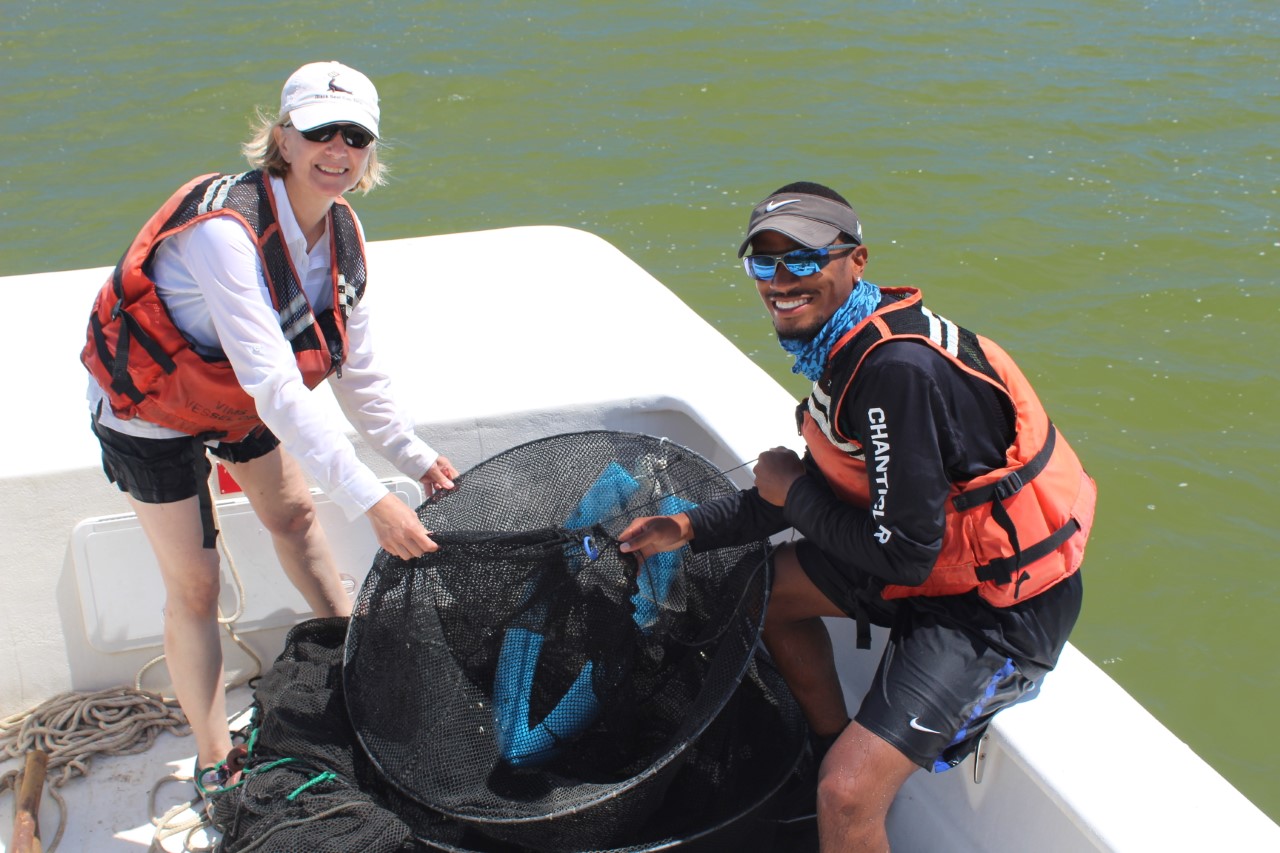
Nicholas and his mentor doing field work.
Mentor: Dr. Mary Fabrizio at the Virginia Institute of Marine Science (VIMS)
What have you been working on?
This summer I have been analyzing the macroinvertebrate assemblages collected in standardized measuring unit for reef fishes (SMURFs) to assess nursery habitat quality for juvenile summer flounder and black seabass in Chesapeake Bay, Virginia. We plan to correlate observed macroinvertebrates with diet studies on juvenile summer flounder and black sea bass to understand which habitats might yield the most potential prey, and therefore better suited to support juvenile summer flounder and black sea bass.
What advice would you give to future interns in your position?
I would recommend that future interns keep an open mind with all the projects and opportunities that are presented to them. Some opportunities may not sound like they fit your interest, but with an open mindset you can explore these options and might discover a newfound interest or at the least you develop some transferable skills.
How has your mentor helped prepare you for a career in environmental management or research?
So far, my mentor has done an excellent job of introducing me to new ways of thinking, sampling techniques, and data analysis methods. However, the aspect that I believe Dr. Fabrizio has helped me with the most is my scientific writing. As part of my internship at VIMS, I had to write a prospectus on my research for the summer. With Dr. Fabrizio’s edits and instruction, I believe that this prospectus was one of the strongest scientific papers I have written, and I plan to incorporate the things I have learned from her into my writing style.
Have your thoughts on what you want to do in the future changed at all? If so, how?
Coming into this internship, my research interest was in fisheries conservation and this has not changed. However, my way of thinking about fisheries conservation changed. Through my internship, I have learned more about the responsibilities of fisheries scientist and the many aspects that go into properly managing fish stocks. Many of the new ideas that I have been introduced to so far at VIMS interest me, and now I am interested in focusing my interest.
Olivia Saliger
Mentor: Dr. Judy O’Neil at University of Maryland Center for Environmental Science (UMCES)
What have you been working on?
I’m investigating emergent harmful algal blooms (HABs) along Maryland’s Atlantic coastline by conducting nutrient bioassays to observe the effect increased nitrogen and phosphorus (Ammonium, Nitrate, Phosphorus, and N+P) has on the phytoplankton population and community composition.
I have learned that marine phytoplankton are generally nitrogen limiting, responding more to ammonium and nitrate than phosphate or N+P. As temperature increases from climate change, and nutrients input anthropologically increases, HAB will have more occurrences with increased severity.
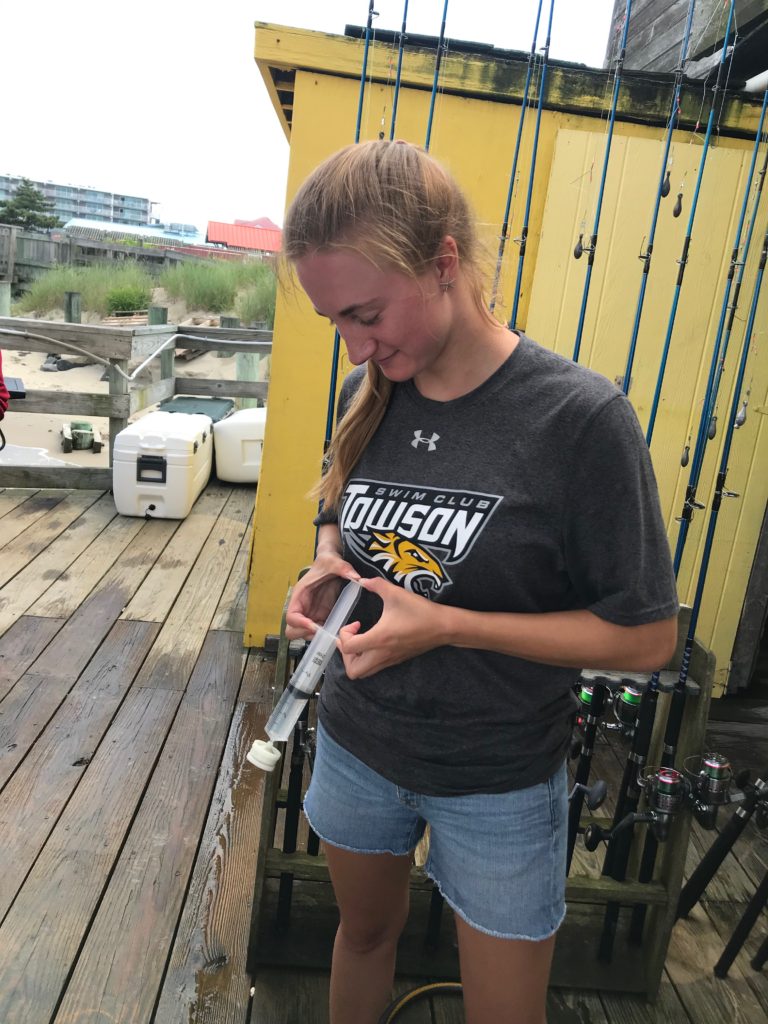
Olivia filtering water while doing some field work.
What advice would you give to future interns in your position?
I advise future interns to utilize their internship to network and make connections not just with your mentor, but everyone you meet. Having an opportunity to conduct research is very beneficial, but it’s all about who you know in order to gain a job or enter graduate school. It’s common sense, but make sure to as far ahead in your research paper, or presentations as you can. Just because there’s no data or results yet does not mean you can’t begin writing the introduction, methodology, or collecting references.
How has your mentor helped prepare you for a career in environmental management or research?
My mentor has been extremely helpful in preparing me for my career as well as networking. She provides guidance and is constantly introducing me to her connections. She sends me conference and career opportunities and shares her resources in academia for me to utilize. I’m extremely lucky to have such a caring, experienced, and thoughtful mentor!
Have your thoughts on what you want to do in the future changed at all? If so, how?
My career goal is to enter marine/estuarine conservation management. Prior to this internship, I was debating focusing on research or implementing conservation projects that would improve conservation efforts. While I enjoy research, I’ve decided that I would not feel useful doing research my entire career. I plan to conduct research in graduate school, but to focus on jobs that would allow me to directly implement conservation projects as efficiently as possible.
Sierra Hildebrandt
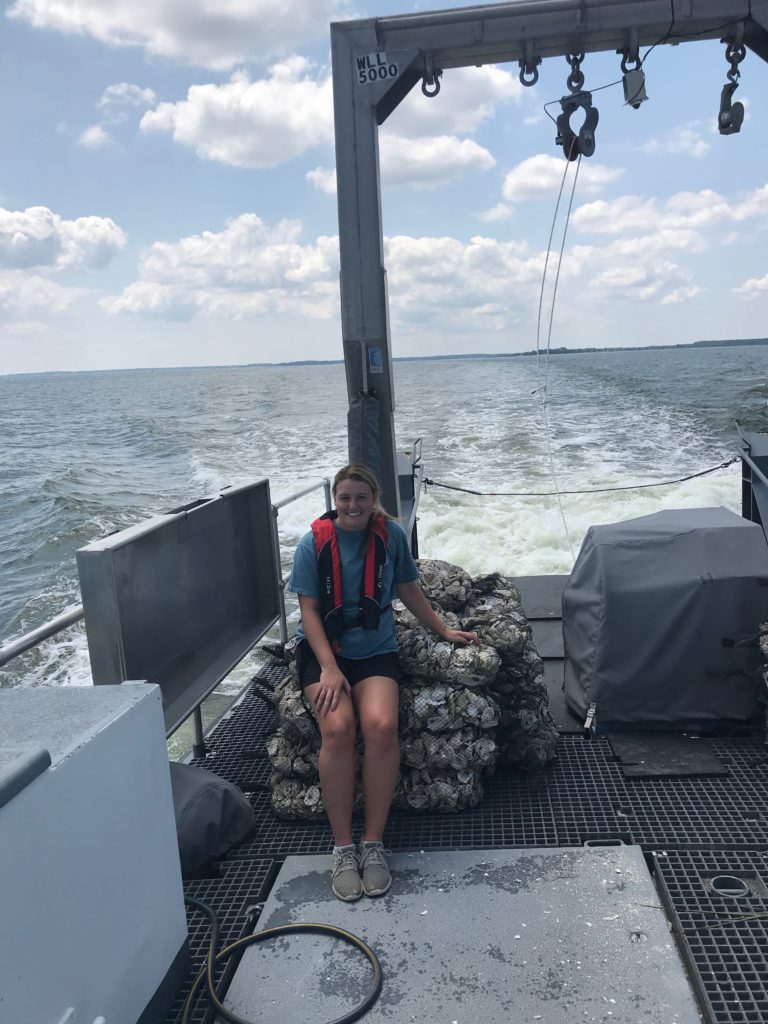 Mentor: Dr. Jason Spires at NOAA Chesapeake Bay Office
Mentor: Dr. Jason Spires at NOAA Chesapeake Bay Office
What have you been working on?
This summer I have been working on the Oyster Direct Setting Project with Jason Spires at the Cooperative Oxford Lab. Since starting my internship, I have learned a lot about oysters including spawning and rearing, marking larvae for re-identification, and writing protocols.
What advice would you give to future interns in your position?
The advice I would give to future interns in my position is to take advantage of every learning opportunity. One opportunity can lead to another.
How has your mentor helped prepare you for a career in environmental management or research?
My mentor has helped prepare me for the unpredictably of research and has shown me ways to adapt to those challenges along the way.
Have your thoughts on what you want to do in the future changed at all? If so, how?
When I decided I had an interest in marine science, I never imagined I would find myself with a curiosity for oysters. Now, I am interning at the NOAA Cooperative on a project about alternative oyster setting techniques. Pursuing a new learning opportunity allowed me to expand my interests in a new way. And now, I may have a future in oyster research.
Wuilliam Urvina
Mentor: Dr. Emily Trentacoste at EPA Chesapeake Bay Program Office
What have you been working on?
This summer I have been working on a few different things. First, I’ve been organizing an inventory of decision tools and creating base programs for further development alongside another intern, Dia Brown. Second, I’ve been working on analyzing water quality monitoring data collected by the Maryland Department of Natural Resources in order to help work out discrepancies in a model for nutrient limitation. Lastly, I’ve been working on the starting steps for a climate advisory poster for vulnerable communities. I’ve learned a lot of things, including the basics of R and Python coding, how to analyze data more effectively, and how management and policy are conducted.
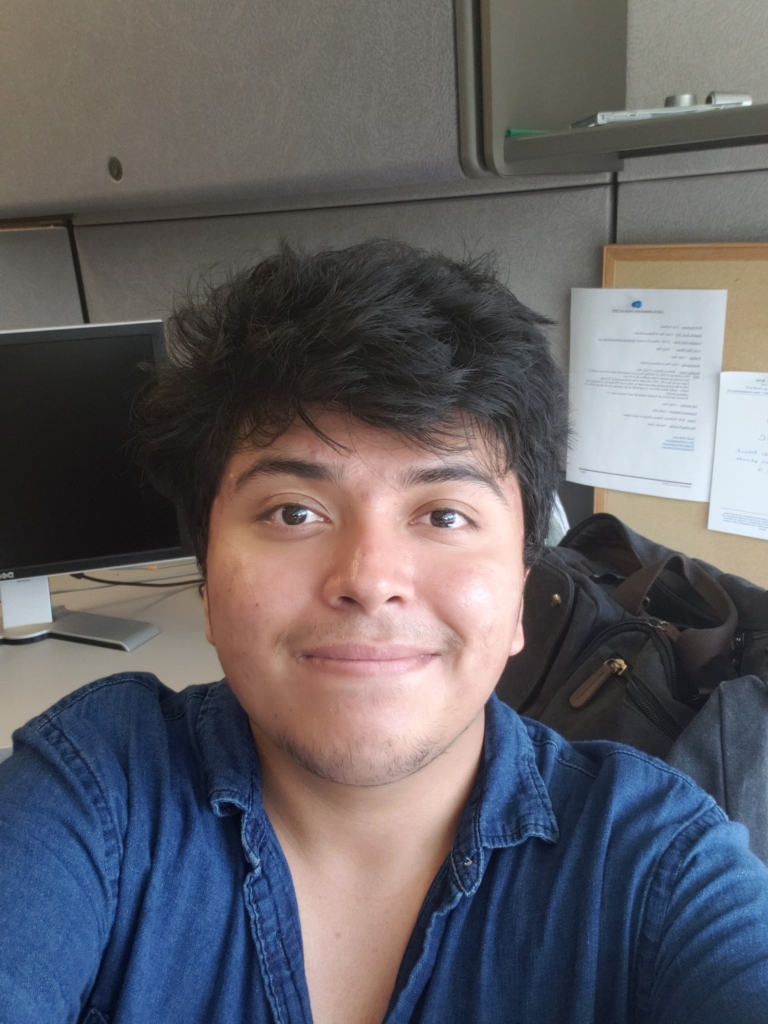
Wuilliam at his desk.
What advice would you give to future interns in your position?
I would tell future interns in my position to be ready for a lot of different opportunities to explore new interests and participate in different projects. It would be helpful to have an idea of what you want to explore more in-depth so that you can get started right away. Otherwise, it might be overwhelming to figure out what you want to focus on.
How has your mentor helped prepare you for a career in environmental management or research?
Dr. Trentacoste has helped me prepare for a career in environmental research by allowing me to analyze different types of data, participate in field sampling, and have an independence in what I want to work with and how I want to go about it. I would say this has given me skills that are beneficial to have in my professional career.
Have your thoughts on what you want to do in the future changed at all? If so, how?
I wasn’t sure what I wanted to work on in the future, except for the fact that it is in the environmental field and possibly related to restoration. I will say that after this internship, I think I wanted to be more focused on the research side, especially on how humans are impacting various ecological systems. However, I also would like to get involved with policy, especially with community outreach to impacted communities.
